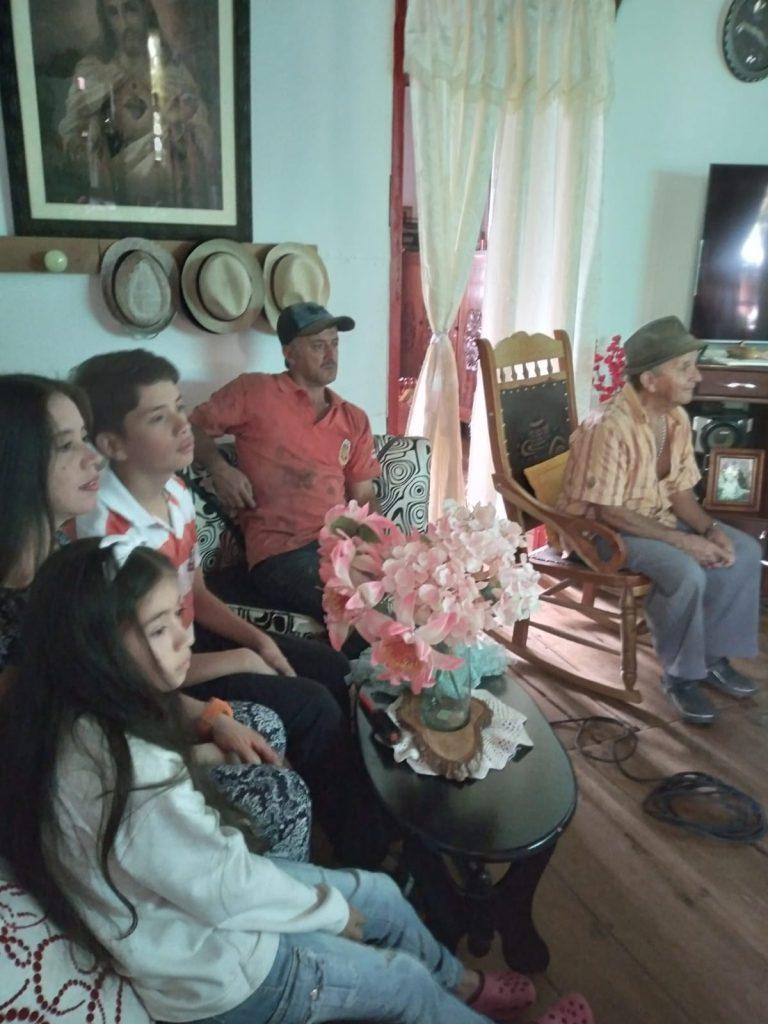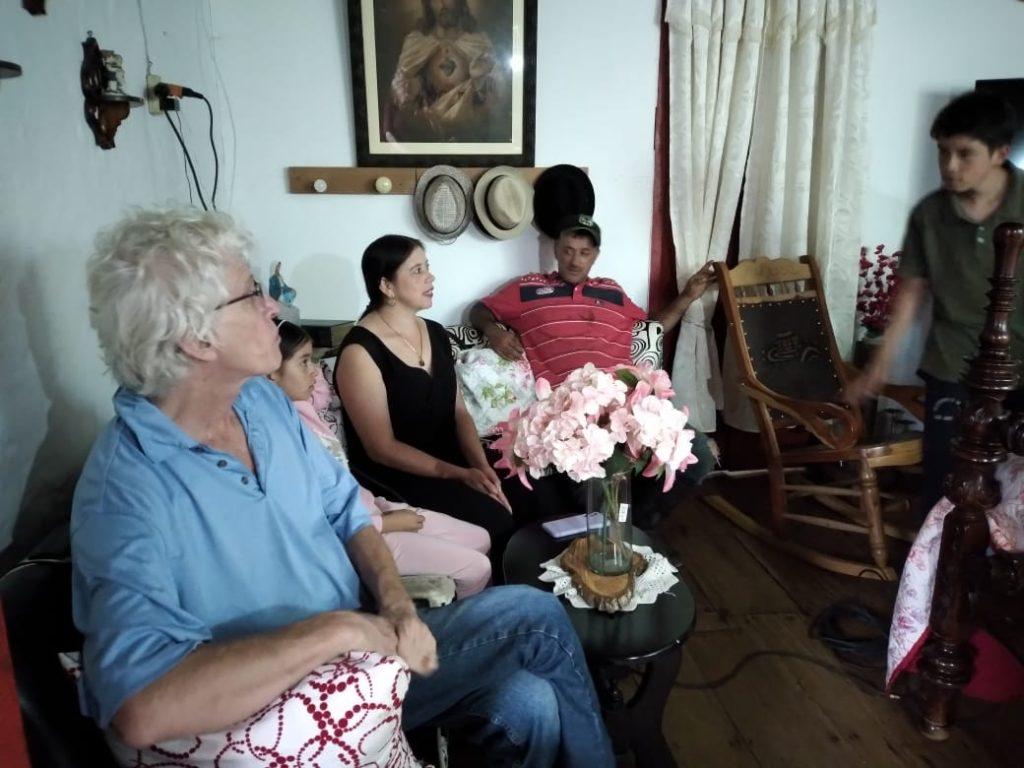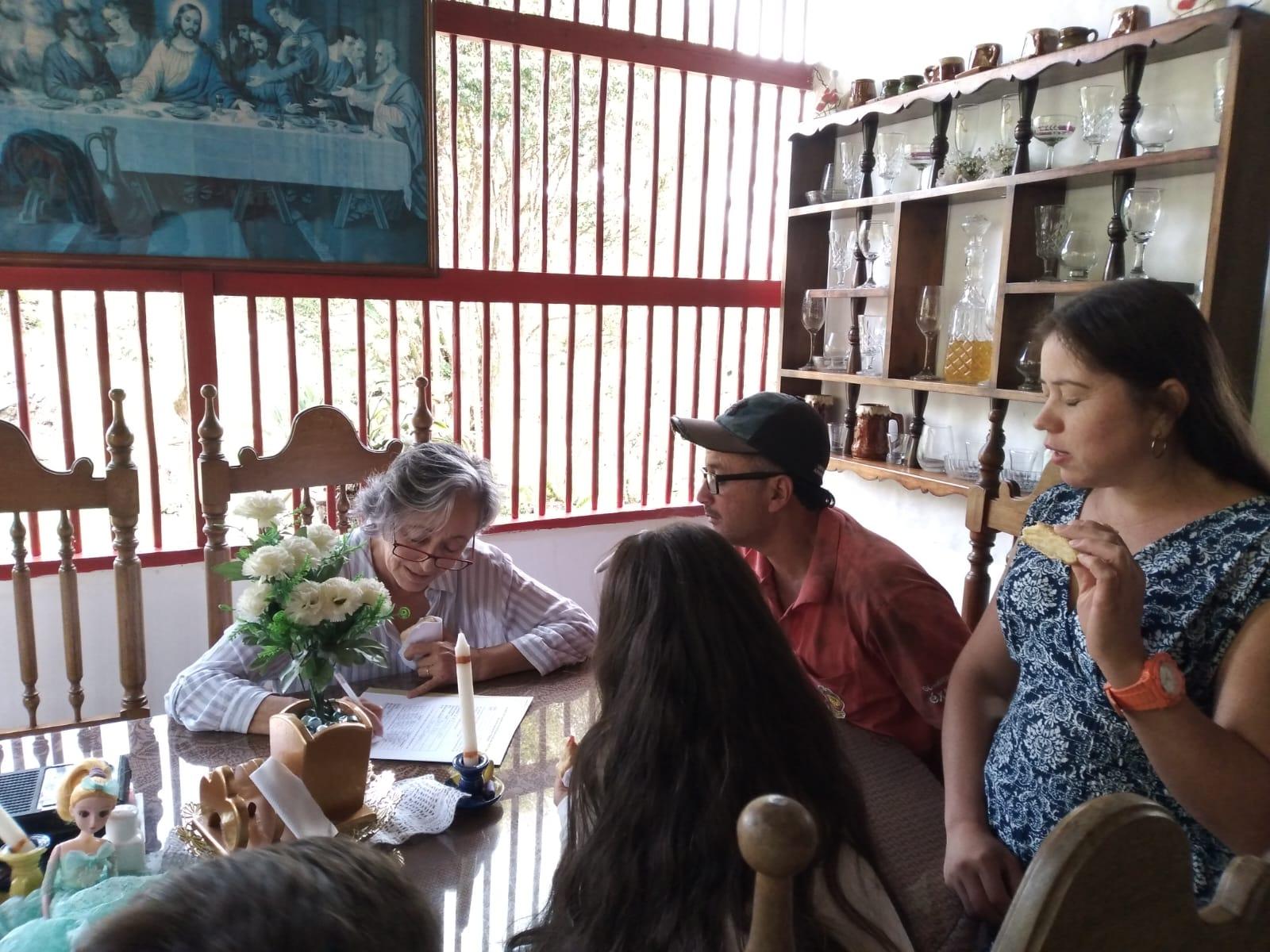This blog post is one of our monthly newsletters for our members and subscribers. We really value transparency, so we would like to share this with everyone.
The process of sharing the stories with you starts with Marta and Patricia, who write the report in Spanish, and then we translate them into English and German. But sometimes, a direct translation is not possible – we need to contextualize and explain what is being shared. This was the case of the August gathering. We discussed the very important topic of climate change and the possibilities of organic agriculture. There were some controversial opinions, and we felt that we needed a broader discussion about the topic. That’s why the following gathering also had this as a theme, and we’d like to share both reports together. It’s a longer read, but we really hope that it brings value and a feeling of connection to the reality at the farm.
Context
In August, the topic of the gathering was: the effects of climate change in the region of Jardín.
When we have our monthly video calls with Robinson, we often start by talking about the weather. Not because it’s a common topic for small talk, but because it is an essential part of the work at the coffee farm. For decades or even centuries, coffee farmers have relied on the climate of the Colombian mountains to cultivate high-quality Arabica coffee. In the past decade, fluctuations in rainfall and temperature have made things less predictable. If it rains too much during the blooming season, the flowers are damaged and fewer cherries are formed. If there’s not enough sun later on, the cherries take longer to ripe, and it’s difficult to dry the beans after they’re pulped, since that’s done in sunbeds. On the other hand, if temperatures are too high, there’s an increased risk of insects and fungi affecting the plants.
In the gathering, organic agriculture came up as a way to promote sustainability. As you will read in the report below, Don Andrés makes a statement that may sound disappointing to us: he says he doesn’t believe it’s possible to have a 100% organic coffee farm. But this answer has to be put in context – at co.hilo, we don’t believe in simple answers. Why does he have that impression?
- The Coffee Federation of Colombia is a powerful institution that, among other things, provides training to coffee farmers about agricultural practices. The interest behind this is to guarantee productivity and increase in Colombian coffee exports. The easiest way to achieve this is by relying on chemical fertilizers. Farmers have been exhaustively trained to follow this and learned that the alternative is lower productivity and, therefore, lower profitability.
- Unfortunately, there have been no positive examples of organic certified coffee in the region of Jardín until now. Without a practical example, it’s difficult to imagine how it could work.
- The amount of extra physical effort required to fertilize coffee plants up and down the hills carrying bags of organic fertilizer is very discouraging in comparison to what they’re currently used to. It’s either more work for them, or they need to hire more workers, which means higher costs.
- In the transition to organic, it may take years until the farm can be certified. In that period, productivity decreases, while there’s no price premium for “in-process-of-certification” products. Most small-scale farmers cannot afford that.
- The actual meaning of “organic” is blurry, both for farmers and consumers. While both might imagine that it means no chemicals at all, there are chemicals that comply with the standards of organic certification.
- Don Andrés has a more traditional point of view since he is the eldest in the family. That leads to more conservative opinions and resistance to change.
We believe in transparency and open conversations. We know we need specialized knowledge for a consultation about more sustainable agricultural practices. That’s in our plans – but that also requires an investment, and it’s something we’re looking at mid-term. So what can we do now?
- We try to bring these topics more often to our conversations, to develop a learning process, focusing especially on the younger generation.
- Marta and Patricia are researching good examples of organic coffee in Colombia. In the following gathering, one of these examples was discussed with them.
- Continue focusing on transparency and quality. Since the beginning of our collaboration with the Giraldo family, the SCAA score of their coffee has increased from 83 to 86,5 – a great result that shows their commitment.
Now, finally, stay with Patricia’s report about the last two gatherings. Enjoy!

co.hilo Gathering #12. 26.08.2023
Climate change and its effects on coffee.
I ask: “Have you noticed changes on the farm in recent years, both in the soil and in the production of coffee and other products?”
“Yes, the soil is drying out”, said Don Andres, “it is shrinking, cracking, the running water is disappearing, and there is less and less coffee.”
“There is less and less coffee, the flowering is scarce and we no longer know if the season is hot or cold, the weather is very unstable and it rains a lot, or the sun is very strong and dries out the soil. In these days of good weather, because it is raining at night and sunny during the day, the bushes should have a lot of flowering and it is not like that, we do not know what is going to happen”, says Robinson.
I continue: “What do you think? Why is this happening?”
“In school they told us it was climate change”, says Anderson.
“And that it’s caused by… greenhouse gasses”, I say.
“What is that?”, asks Isabela.
We projected some videos and talked about CO2 and the increase of these gasses in the atmosphere and, as a consequence, global warming; the predictions for the sector with losses of up to 50% of the land suitable for cultivation in the next 30 years; and the displacement towards higher lands. We explained to Isabela her doubts and concerns.
We also talked about the importance of having good coffee-growing practices to face climate change. They have filtration tanks for the wastewater from the coffee processing and with the pulp, they fertilize the crops of vegetables and plantain. In their opinion, they handle insecticides responsibly, because they only use them on young coffee – “if we do not fumigate the young coffee, it does not grow because it gets a lot of pests”. They never burn the soil and in all the planted lots they have trees or banana trees for shade, they tell us.
“Could we have 100% organic crops?”, I ask…
“No. It would have to be in new lands, these lands are tired and we have to stimulate them to produce and that is achieved with fertilizers. No matter how good the organic fertilizer is, it does not compare with chemical fertilizers. Imagine, Patricia”, says Don Andrés, “on these hills with a bag of chemical fertilizer, you can fertilize 500 plants and with the same bag of organic fertilizer, only 6 plants – and the result is not the same. The land needs a lot of input.”
Thus we reach the end of the conversation, understanding that in the Clavel farm, the cultivation of coffee is based on good agricultural practices and that this is reflected in the quality of the coffee.

co.hilo Gathering #13. 07.10.2023
The Gathering was originally scheduled for 30.09, but it had to be postponed due to an emergency with a cow at the farm.
At this gathering, we had a special guest, Camilo Rojas, Marta’s brother and Martín’s uncle. On the night before, he had read his poems at “Habrá una vez”, the reading circle promoted by Jardín Municipio Lector and part of the educational activities funded by co.hilo.
In this gathering, we spoke about the future. We talked about how each of the members of the family sees themselves in twenty years, how they see the others, and what will be their relationship with the cultivation of coffee. It is clear to everyone that Camilo (Robinson’s eldest son) is the one who will continue the coffee-growing tradition that he has learned from his grandfather, father, neighbors, and friends.
In what state will he receive the land? Will he be able to make a living from it? What must be done to make coffee growing profitable and sustainable over time, and how will we face climate change? These are the questions that we’re faced with.
We then watched a video about organic coffee farming under shade, a Colombian experience that has been developed in Santander, one of Colombia’s coffee growing departments, and the place through which coffee entered the country.
Step by step we comment on the video. We notice the global need to return to agricultural practices prior to the use of fertilizers and pesticides; to generate a clean agricultural production, conserve natural resources, and make possible the future well-being of our children.
Robinson tells us that he is willing to initiate the transformation, that they are already producing fertilizers on the farm and using them on the banana and avocado. But that it is a slow process, he would like to know about more successful experiences in Colombia and see the viability of the change.
Coffee is the livelihood of the family and the fear of change is understandable, however, we emphasize the need to achieve 100% organic coffee growing under shade because it conserves the environment, biodiversity, and guarantees the cleanliness of the coffee. This is the coffee growing of the future and we have to find a way to return to it.
Closing remarks
August marked the 12th edition of the monthly gatherings at the farm – one year! On August 28th, 2022, we had the first one. This format was the result of discussions with Patricia and Marta about how to maintain a more direct relationship with the Giraldo family and create a space to openly talk about important topics.
From our perspective, this series of gatherings has been very successful, and we would love to know what you think about it. Get in touch with us, and share your impressions!
As we move forward as a cooperative, we also see these gatherings as a moment of communication between the members in Germany and the farmers in Colombia. Sometimes we send videos or messages from customers, and they are super happy to see them.
We appreciate your support highly and strongly encourage you to become a member of our cooperative. With more members investing, we can expand the impact of the project to more families.
Click here to learn more about how to become a member.

